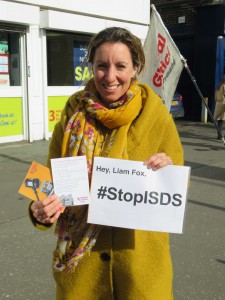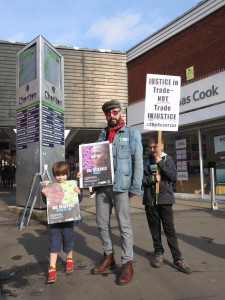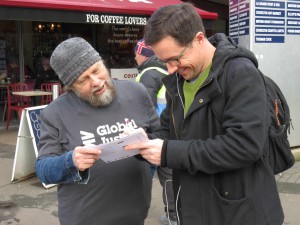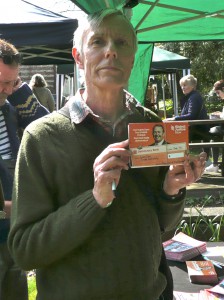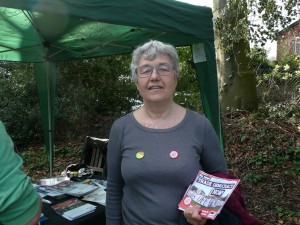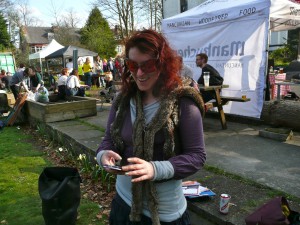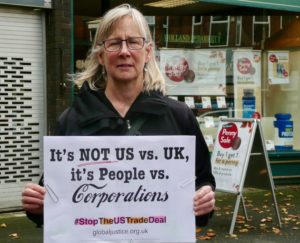 The pandemic preoccupying and dominating the public’s consciousness, many more fundamental issues are in danger of being overlooked. So Global Justice Now, along with Trade Unions, War on Want, Traidcraft and others called for a national Day of Action on Saturday 24th. October, looking for images to use in publicity and for a photo petition as well as to raise awareness in the general population.
The pandemic preoccupying and dominating the public’s consciousness, many more fundamental issues are in danger of being overlooked. So Global Justice Now, along with Trade Unions, War on Want, Traidcraft and others called for a national Day of Action on Saturday 24th. October, looking for images to use in publicity and for a photo petition as well as to raise awareness in the general population. 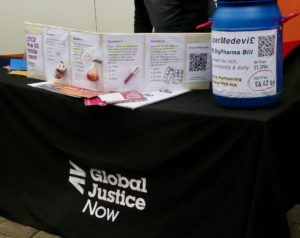
The threatened trade deal has numerous strands, all of which threaten our institutions, our standards and our democracy. They are even more dangerous to people in the Global South. If the UK’s acceptance is rolled out as a benchmark of what is required to trade with the dominant economic powers. In Manchester, we united with allies and made several outings to protest the deal. We also invited people to send in and post photos of themselves, their dogs, homes and associates with the message “Stop the US Trade Deal”.
Thursday (22nd. Oct.) saw us in Chorlton, exploiting the wide pavement outside Oxfam on Wilbraham Road and using a simple quiz-display to stimulate engagement with questions on US standards in food hygiene (how many rat hairs  are allowed in 25g of cinnamon), permitted insecticide residues allowed on apples, toxic ingredients banned in cosmetics, and the expected cost of the 50 most expensive medicines used in primary care. This proved an excellent way of engaging people. Unusually we didn’t have cards to sign but the excellent flyer GJN had produced gives a link to an e-action and we had a QR code for those who wanted to find out more with their mobile phones. Footfall was disappointing, but with a higher than usual percentage engaging.
are allowed in 25g of cinnamon), permitted insecticide residues allowed on apples, toxic ingredients banned in cosmetics, and the expected cost of the 50 most expensive medicines used in primary care. This proved an excellent way of engaging people. Unusually we didn’t have cards to sign but the excellent flyer GJN had produced gives a link to an e-action and we had a QR code for those who wanted to find out more with their mobile phones. Footfall was disappointing, but with a higher than usual percentage engaging. 
Next day we focused on the threat to democratic authorities taking action to stop climate change and joined with 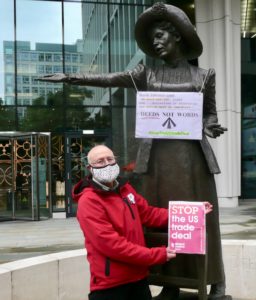 War on Want, Fridays for the Future, and Greater Manchester Campaign Against Climate Change’s normal vigil outside the Central Library.
War on Want, Fridays for the Future, and Greater Manchester Campaign Against Climate Change’s normal vigil outside the Central Library.
Even the statue of Emmeline Pankhurst joined the protest, reminding Boris Johnson of his commitment on climate change, “We must act now, right now … extinction is forever, so our action must be immediate,” with the suffragist slogan slogan “Deeds Not Words”.
And on Saturday itself we combined with War on Want and Keep Our NHS Public 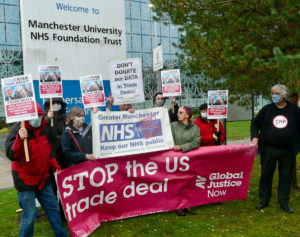 activists to stage a photo-op outside the MRI complex on Hathersage Road.
activists to stage a photo-op outside the MRI complex on Hathersage Road.
This brought honks of support from passing traffic and was streamed live by a KONP supporting media student.
Pia Feig (a GJN member and NHS activist spoke about the threat to our health service, not simply in being directly “taken over”, but of the threat of “standstill and ratchet clauses” being included in the deal, progressively biting off chunks of our service. 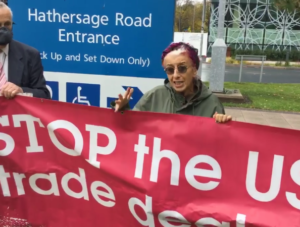
She also drew attention to the looting of the NHS patient records database. This is probably the most complete patient health database in the world and is an extremely valuable resource for medical research. Its sale to trans-national corporations is one of the least noticed ways in which the the Government is privatising the NHS. It is yet another example of how publicly funded research and knowledge production is expropriated by trans-national capital for profit, rather than being used for the benefit of patients. Big Pharma will look for lucrative opportunities to develop expensive medicines for minor complaints, rather than tackling public health priorities. Meanwhile, US insurance companies will want to use the data to identify and discriminate against the most vulnerable by refusing insurance to them.
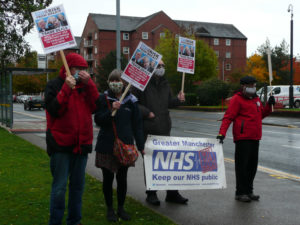 Stephen Pennells picked up on the indirect threats to health, reprising the threat to nutrition through US food standards before going on to talk about employment, climate change, government secrecy and the worrying record of Biden, as Obama’s deputy supporting TTIP. This means that whoever is elected President, the campaign will have to further intensify. Both govenments, freed from the deadline of the US election will want something to spin as an economic opportunity in the aftermath of the pandemic’s effect on business, jobs and profits.
Stephen Pennells picked up on the indirect threats to health, reprising the threat to nutrition through US food standards before going on to talk about employment, climate change, government secrecy and the worrying record of Biden, as Obama’s deputy supporting TTIP. This means that whoever is elected President, the campaign will have to further intensify. Both govenments, freed from the deadline of the US election will want something to spin as an economic opportunity in the aftermath of the pandemic’s effect on business, jobs and profits.
These actions reinforced alliances and spread our message. We learnt that we need to develop our media skills. Our speeches were unscripted and reasonable in terms of the “Just a Minute” criteria of speaking without “hesitation, repetition or deviation”. However a quarter of an hour is too long for modern attention spans and it would have benefitted from interactive questioning or reflective prompts.
So we are planning to work on this with a couple of our new recruits, one of whom is a new media student at Salford Uni. If you would like to be involved, don’t be shy!
